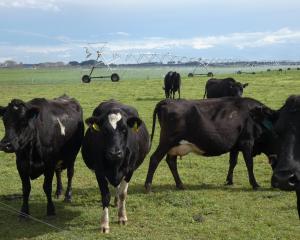Ngai Tahu Farming has been ordered to pay just over $211,000 to a Southland farming company after pulling the pin on a contract for 1000 calves over Mycoplasma bovis concerns.
John Young Farming Ltd brought the civil case against the iwi to court in Invercargill last month.
Associate Judge Kenneth Johnston reserved his decision at the end of the hearing and the judgement was recently delivered.
When contacted yesterday, Ngai Tahu Farming chief executive Andrew Priest said the company respected the court's decision and did not plan to appeal.
However, it stood by what it did because its highest priority was ensuring no further spread of M. bovis, either to its own properties or to the rural communities it operated in, he said.
When contacted, John Young said there was a "sense of relief" the case had been brought to "some sort of conclusion".
He appreciated all the support received from Southland farming businesses and the neighbouring community.
In August 2017, the two parties entered into a contract in which Ngai Tahu Farming agreed to buy the Friesian rising 1-year-old bulls at $3 plus GST per kg liveweight, to be delivered between March 1 and May 31, 2018.
The contract stated the cattle should be in good health and free from injury or disease and Ngai Tahu Farming had the right to reject cattle which did not meet specifications.
John Young Farming later sued Ngai Tahu Farming, alleging it breached the contract when, on May 18 last year, it indicated it was not prepared to take delivery of the cattle.
Evidence showed Ngai Tahu Farming developed a set of protocols to safeguard its farms and stock from the spread of bacterial cattle disease M. bovis, which were implemented during late 2017 and early 2018.
There was no evidence John Young Farming was informed of the steps Ngai Tahu Farming was taking, the judgement said.
On March 15, 2018, John Young Farming - through Mr Young and presumably at the request of Ngai Tahu Farming - provided a declaration concerning the provenance of the cattle and the risk of them having been exposed to the M. bovis bacterium.
In effect, Mr Young's declaration was that "to the best of [his] knowledge and belief", the cattle had not been so exposed.
Clearly, that declaration did not satisfy Ngai Tahu Farming because it then engaged a livestock agent to make further inquiries about the provenance of the cattle, the judgement said.
Ngai Tahu Farming was not satisfied it had sufficient information about the cattle to be sure that their introduction to its farms would meet the protocols it had put in place.
A text message from Ngai Tahu Farming's agent to John Young Farming's agent advised Ngai Tahu Farming was not prepared to take delivery of the cattle.
Faced with Ngai Tahu Farming's refusal to accept delivery of the cattle, the company sold them to other buyers through its livestock agent.
Mr Young's evidence was that whereas the contract price agreed between the parties would have resulted in a total sale and purchase price of $568,972.95, the best prices that could be achieved in mid-2018 resulted in a return of $456,957.35. John Young Farming claimed the difference of $112,015.60.
Other costs of more than $99,000 were also sought; because the company had to hold on to the cattle for longer than expected, it incurred additional costs in relation to labour, feed and transport, while there was also pasture damage caused by the cattle remaining for longer on the property leased for the purpose, which resulted in regrassing costs.
Evidence from a livestock agent was that testing for M. bovis was possible but difficult at the time because of the pressure on resources following the outbreak of the disease.
The parties entered into a contract that did not expressly address that risk. In those circumstances, it was for each party to manage the risk it perceived itself to have under the contract.
At no stage was a clear request made to John Young Farming that would have triggered an obligation to provide the information Ngai Tahu Farming now said it was looking for, the judgement said.
It was clear John Young Farming had access to detailed information on the provenance of the cattle.
"There is no reason at all to think that John Young Farming would not have provided this to Ngai Tahu Farming had it been requested in clear terms."













